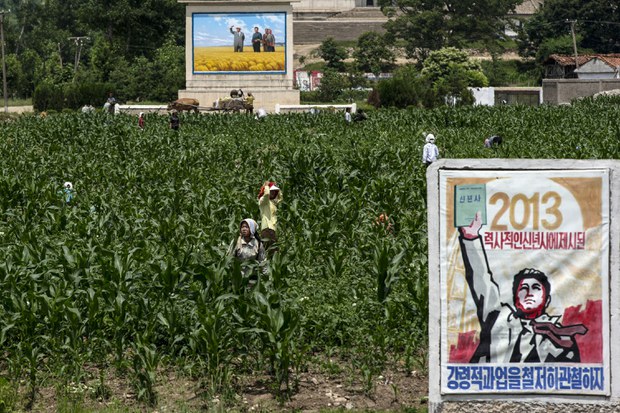North Korea’s ‘corn inspection squads’ patrol rural streets to catch grain thieves
Share

Farmers work in a corn field at a village in Sinwon county, in South Hwanghae province, North Korea, June 22, 2013. In North Hwanghae province, corn inspection squads have been placed near farms and farmers’ residences and will be on duty until the harvest in September, a source said.
Authorities in North Korea have organized “corn inspection squads” that patrol areas near rural collective farms and stop citizens to check their bags for stolen grains, sources in the country told RFA.
The country is suffering from a shortage of food, unable to produce enough to feed its population of more than 25 million people and unable to bridge the gap with imports due to trade restrictions designed to curb the spread of COVID-19.
The CIA World Factbook estimates that the food gap in North Korea is 860,000 metric tons (about 950,000 U.S. tons), or about two to three months’ worth of food consumption.
Sources told RFA that although the patrols are intended to stop thieves, innocent people who happened to be carrying grains and merchants who rely on the grain trade to make a living have also been caught in the dragnet.
In the city of Tokchon, north of Pyongyang in South Pyongan province, the inspection squads have been deployed to every street that goes to the farms to inspect passersby for illicit grains, a source in the province told RFA’s Korean Service on condition of anonymity to speak freely.
“Yesterday, the corn inspection squad consisted of two members who stood guard on the road on the way out to the city from Sinsong village to the city downtown,” the source said. “They stayed there all day, checking people’s bags and bundles. They checked my backpack.
“I had grains of corn and kidney beans in my backpack, which my relative in rural Sinsong village gave me,” the source said. “As soon as the corn inspection squad saw the corn and beans, they tried to confiscate them, accusing me by asking, ‘Didn’t you steal it from the cooperative farm?’ An argument broke out on the spot.”
The source said patrol members forced her to go back to the village to get confirmation that the grain had been given to her by her relatives.
“I was so angry that they told me to do that,” she said.
In North Hwanghae province, south of Pyongyang, corn inspection squads will be on duty until the harvest in September, a source there told RFA on condition of anonymity to speak freely.
“The crackdown and control by the corn inspection squad is more focused on merchants who load large quantities of corn onto buses and distribute it to other markets at bus stops that take it to various parts of the country,” said the second source.
“Merchants who were targeted by the police lost whole corn sacks. They are protesting that they did not steal the corn from the cooperative farms, but that the individual farmers bought the corn, harvested from the farmers’ gardens,” she said.
The second source explained that farmers who live in rural farms own gardens sized 50 pyeong or larger (1779 square feet). There they can plant and cultivate corn for private use. If a merchant can buy corn from 10 farmers, it is almost as if they bought the corn in bulk.
“Residents criticize the crackdown, saying that the authorities are punishing people who trade grain to make ends meet,”she said. “The authorities have not thought of supplying food to the residents but encouraged higher food prices in the marketplaces.”
Translated by Claire Shinyoung Oh Lee. Written in English by Eugene Whong.







